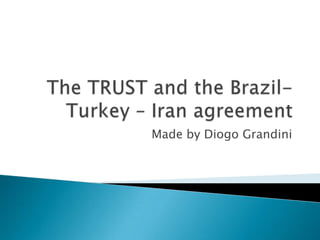The trust and the brazil turkey ŌĆō iran
- 1. The TRUST andtheBrazil- Turkey ŌĆō Iran agreementMadeby Diogo Grandini
- 2. A┬Ānuclear weapon┬Āis an explosive device that derives its destructive force from┬Ānuclear reactions, either fission┬Āor a combination of fission and┬Āfusion. Both reactions release vast quantities of energy from relatively small amounts of matter; a modern thermonuclear weapon weighing little more than a thousand kilograms can produce an explosion comparable to the detonation of more than a billion kilograms of conventional high explosive. Thus, even single small nuclear devices no larger than traditional bombs can devastate an entire city by blast, fire and radiation. Nuclear weapons are considered┬Āweapons of mass destruction, and their use and control has been a major focus of┬Āinternational relations┬Āpolicy since their debut.The Nuclear Weapon
- 3. In the history of warfare, only┬Ātwo nuclear weapons┬Āhave been detonated offensively, both near the end of World War II. The first was detonated on the morning of 6 August 1945, when the┬ĀUS┬Ādropped a┬Āuranium┬Āgun-type device code-named ŌĆ£Little BoyŌĆØ on the┬ĀJapanese┬Ācity of┬ĀHiroshima. The second was detonated three days later when the United States dropped a plutonium┬Āimplosion-type device code-named ŌĆ£Fat Man" on the city of Nagasaki, Japan. These┬Ābombings┬Āresulted in the immediate deaths of an estimated 80,000 people (mostly civilians) from injuries sustained from the explosion. When factoring in deaths from long-term effects of┬Āionizing radiation┬Āand acute┬Āradiation sickness, the total death toll is estimated at 120,000. The use of these weapons remains┬Ācontroversial.TheHistoryof Nuclear Weapon
- 4. Turkey and Brazil, both non-permanent members of the U.N. Security Council, have offered to mediate one of the most complicated conflicts that we have been living nowadays their promises is to find a resolution to the impasse at a time when world powers are in talks to impose a fourth round of U.N. sanctions on Iran. The agreement among those countries has looked a guarantee of security and peace.
- 5. SecurityCouncilPermanentMembersThe security Council Permanent Members are all nuclear weapons possessors. They all see this agreement with distrust , they say that the Iranian regime didn't accomplish last agreement signed by its governments. Accusing that the Iran Government it is only interested in gaining time to build a Nuclear Bomb. The superiority of those countries is reinforced if those agreement does not work, reaffirming the power and the influence of the Five Permanent Members.
- 6. The┬Ānuclear program of Iran┬Āwas launched in the 1950s with the help of the United States as part of the Atoms for peace┬Ā┬Āprogram.┬ĀThe support, encouragement and participation of the United States and Western European governments in Iran's nuclear program continued until the 1979 Iranian Revolution┬Āthat toppled the┬ĀShah of Iran. After the 1979 revolution, the Iranian Government┬Ā┬Ātemporarily disbanded elements of the program, and then revived it with less┬ĀWestern assistance than during the pre-revolution era. Iran's nuclear program has included several research sites, two┬Āuranium┬Āmines, a┬Āresearch reactor, and uranium processing facilities that include three known┬Āuraninum enrichment plants. The long delayed startup of Iran's first nuclear power plant, Bushehr I, was most recently estimated for the middle of 2010.┬ĀThere are no current plans to complete the Bushehr┬ĀII reactor, although the construction of 19 nuclear power plants is envisaged.Iranhas announced that it is working on a new 360┬ĀMWe┬Ānuclear power plant to be located in┬ĀDarlhovin. Iran has also indicated that it will seek more medium-sized nuclear power plants and uranium mines for the future.Why Iran?
- 7. trust┬Āverb┬Ā(BELIEVE)┬Ā┬Āto have belief or confidence in the honesty, goodness, skill or safety of a person, organization or thingTrust








